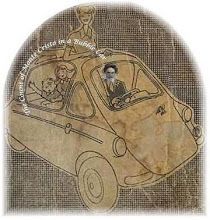 It has been many years since I have read a science fiction novel. Whilst browsing in a second-hand bookshop I happened upon "The Dark Light Years" by Brian Aldiss. The blurb on the back cover of this slim novel, published in 1964, describes it as difficult and one of Aldiss' best. Both my recollection of Aldiss as an accomplished science-fiction writer and some nostalgic recollections from my childhood made me decide to buy this book.
It has been many years since I have read a science fiction novel. Whilst browsing in a second-hand bookshop I happened upon "The Dark Light Years" by Brian Aldiss. The blurb on the back cover of this slim novel, published in 1964, describes it as difficult and one of Aldiss' best. Both my recollection of Aldiss as an accomplished science-fiction writer and some nostalgic recollections from my childhood made me decide to buy this book.However, I almost gave up reading the novel after a few pages; the reason being that the initial setting is so bizarre, and yes, alien, and one has to make a real effort to comprehend the "Utods"; ungainly six-limbed creatures who enjoy wallowing in their own faeces, not to mention also having a penchant for slapping the stuff over each other. In addition, we are faced at the outset with the Utod's "middensteads" (i.e. homesteads made from dung), their salad beds, and their strange modes of communication involving the use of use of mouths, anuses, and other orifices. Then there is the problem of trying to figure out the significance of the presence of the elderly exile, Ainson, amongst the Utods. Ainson is a human who, after several decades amongst the Utods, has learned enough of the their language (something like a simplified pidgin form) to be able to tell them he is popping indoors for a lie down. Thankfully, it does all become clear after a while.
The irony of what I have just said in relation to comprehending the Utods is that this turns out (I believe) to be the central theme of the novel: the two life forms, Utods and humans, each of them with complex languages, highly-developed emotions and advanced space-faring technologies, just cannot figure each other at all. The Utods feel no pain, are completely passive, have difficulty with the concept of something being "bad" and do not look upon death with horror (this is merely seen as "progressing to the carrion stage"). Needless to say, humans are not like this, and so you can be in no doubt as to which life form you will end up rooting for in the end, notwithstanding the Utod's aversion to cleanliness. In fact, you becomes so sympathetic towards the Utods that when trigger-happy unconscionable humans decide to shoot some of them on a game hunt it creates a feeling of repulsion much like you would expect to feel if you witnessed a panda hunt. The vivisection of some Utods, who can't comprehend why the humans are slicing them up, also makes for uncomfortable and disturbing reading. One might be tempted to think of the novel as a metaphor for imperialism, but this only works to a certain degree because we don't here have a technologically-advanced civilization encountering and forcing itself on a relatively primitive one; this encounter is more like the exact opposite to a meeting of minds.
A large portion, if not most, of the novel takes place on the planet earth in the early part of the twenty-first century. This aspect of the novel shows how notoriously difficult it is really to predict the future, especially in terms of technological, social and political developments. Apparently, people still send letters as their main form of long-distance communication; Britain is at war with Brazil, and London at least feels little more than a very polluted version of 1950s Britain with some space-age gizmos thrown in for good measure. Moreover, the Soviet Union still exists, and so at least George Galloway would be happy. Some things, however, are quite plausible; for example, that that long-distance space travel is accomplished not by propulsion, but by the manipulation of the very fabric of space and time; most scientists agree that this is certainly the only way to consider crossing the vastness of inter-stellar space.
The novel is pessimistic, but is not without its lighter moments: On landing on a new world, and after opening a hatch on their spacecraft, a high-ranking Utod claims ownership of the new world for his species by saying, "I pronounce all this to be land belonging to the Triple Suns. Let defecation commence." Not quite Neil Armstrong, but this novel does represent one giant leap for imagination; I thoroughly recommend it, but be prepared to be disturbed and maybe even a little upset.





No comments:
Post a Comment